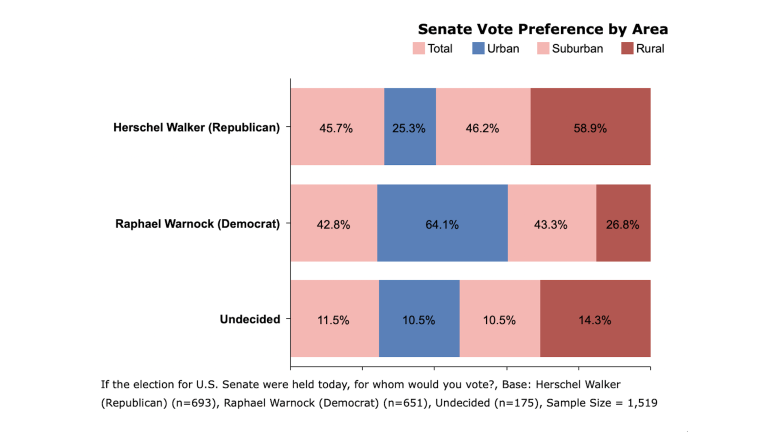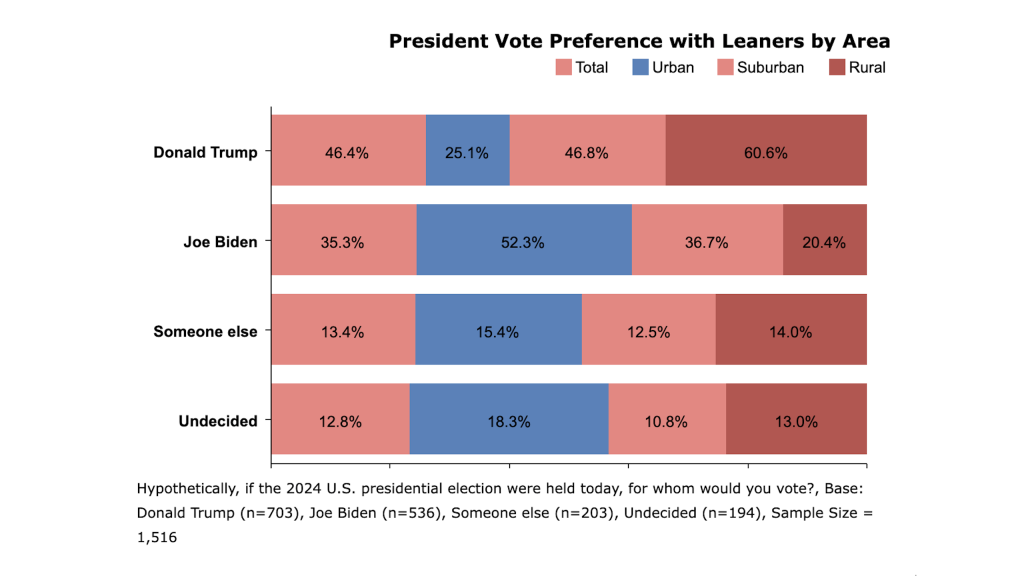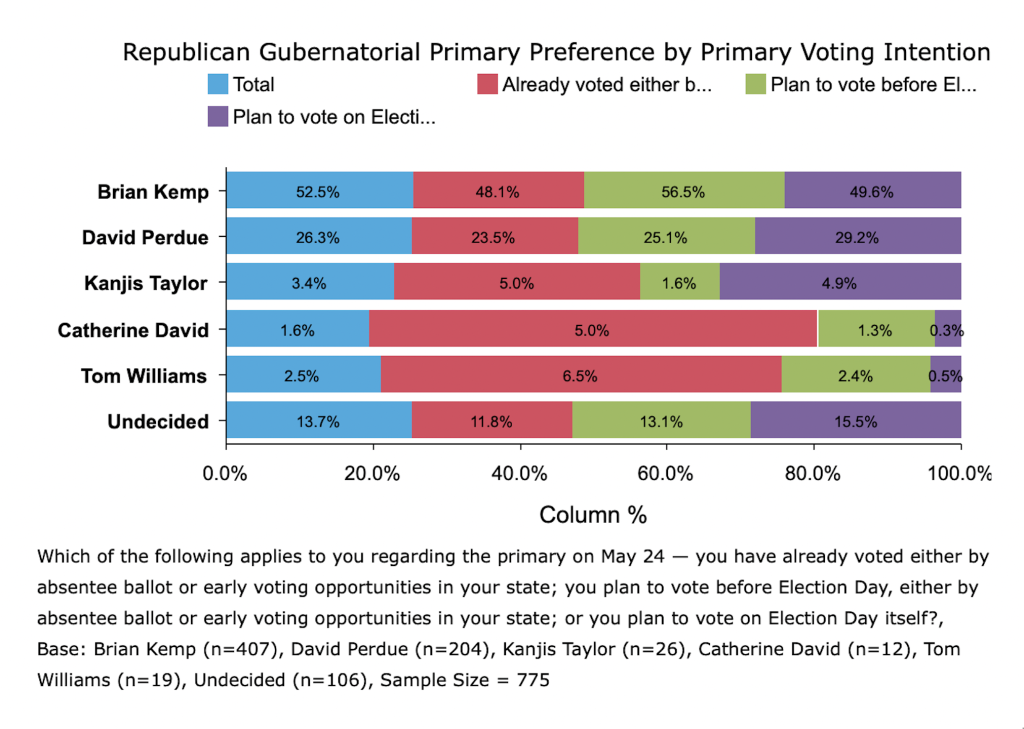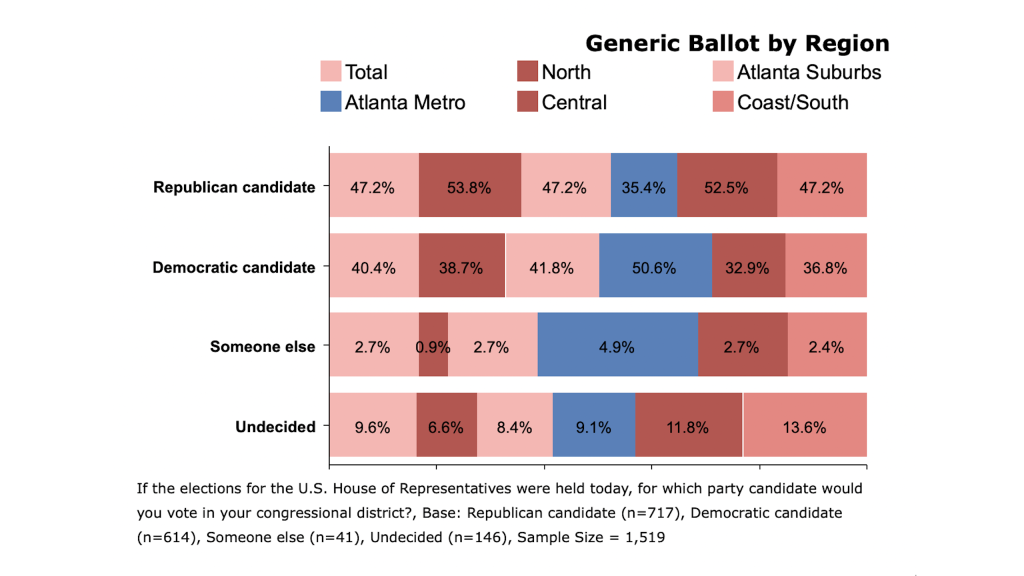Please Follow us on Gab, Minds, Telegram, Rumble, Gab TV, GETTR, Truth Social
The CD Media Big Data Poll in Georgia finds Democratic voters trust their party and state leaders to remain neutral in primaries and oversee fair elections more than other voters. Republicans and independents have little faith in party and state leaders to conduct primary and general elections fairly.
Thinking about primary elections, how much trust do you have in your party leaders to remain neutral and allow voters to decide on nominees?
When it comes to party neutrality in primaries, a third (33.3%) of Democratic voters say they have “a great deal” of trust in their party leaders. That compares to roughly only 1 in 5 (21.3%) Republicans and 1 in 10 (10.3%) independent and third party voters.
One-third of Republicans (33.3%) and a majority (57.4%) of independents at least expressed they have “not very much” trust, to include “none at all” coming in at 5.0% and 17.4%, respectively.
Only 3.5% of Democrats said “none at all”.
“Even though we saw decent percentages among those who expressed ‘a fair amount’ of trust, it’s not exactly a glowing endorsement,” Big Data Poll Director Rich Baris said. “The chosen scale really does underscore how soft voters are on this issue of trust in elections.”
By area, both urban and rural voters interestingly express the least amount of trust in their party leaders to remain neutral during primaries, though urban voters also express the highest amount of trust, with 30.3% saying “a great deal”. That’s nearly half the percentage of rural voters (15.5%) who say the same.
Thinking about general elections, how much trust do you have in state leaders to oversee free and fair contests?The same is true by area when voters are asked about their trust in state leaders to oversee free and fair elections. In urban areas, 29.0% expressed “a great deal” of trust versus only 14.0% in rural areas. Suburban voters came in at 21.5%.

The CD Media Big Data Poll in Georgia finds Republican challenger Herschel Walker leads incumbent Democratic Senator Raphael Warnock 45.7% to 42.8%. That’s a slightly narrower margin than the 5-point lead the poll found for Walker in September.
In the Republican primary for the U.S. Senate, the former football star holds a commanding lead at 58.6%, with 18.6% undecided. Gary Black, the closest rival, trails far behind at 7.6% of the primary vote.
“Herschel Walker is very likely to be the Republican nominee for the U.S. Senate in Georgia and has consistently led the Democratic incumbent,” Big Data Poll Director Rich Baris said. “While the race tightened somewhat, the fundamentals still suggest Walker will be the favorite in November.”
“Walker has consistently led in the suburbs statewide and that bodes well for his chances among undecided voters in the suburbs outside of Atlanta.”
By race, white voters overwhelmingly support Mr. Walker, 63.2% to 25.6%, a margin that even exceeds Donald Trump in a rematch against Joe Joe. More than 3 in 4 (76.1%) of black voters back Senator Warnock, while 12.6% back the Republican.
Worth noting, Walker is underperforming both Trump and Generic Republicans among Hispanic voters. While they appear to be trending toward Trump and the GOP ahead of the midterms—slightly backing Republicans 43.8% to 43.4% and Trump by a wider 47.0% to 41.9% margin—Senator Warnock leads this bloc 48.7% to 36.1%.
By area, Warnock leads Walker only among urban voters, 64.1% to 25.3%. Walker leads Warnock among rural voters, 58.9% to just 26.8%, and in the suburbs by 3 points, 46.2% to 43.3%.
Independent and third party voters break for Mr. Walker 42.5% to 34.4%.
The CD Media Big Data Poll in Georgia interviewed 1,519 likely voters statewide via Peer-to-Peer SMS to an online survey panel from May 8 to May 11, 2022. The survey sampling error is ± 2.5% at a 95% confidence interval. Results are weighted to represent national voter file demographics in the state to include gender, age, race and region. The likely voter screen includes vote history and self-reported likelihood to vote. It’s important to note that sampling errors for subgroups are higher. Full crosstabs.
The CD Media Big Data Poll in Georgia finds former President Donald Trump holds a large lead over President Joe Biden in the Peach State, 46.4% to 35.3%. Of those who voted in 2020, Trump leads Biden 47.5% to 36.9%.
“Joe Biden is now extremely unpopular in the state of Georgia,” Big Data Poll Director Rich Baris said. “He was the first Democratic nominee to carry the state since Bill Clintonin 1992, but now voters would rather see the 45th President back in office.”
“Minority voters have shifted considerably toward Donald Trump since 2020 and the drop in support among white voters for the current president has been devastating.”
”By race, white voters overwhelmingly support the 45th President, 61.9% to 22.0%, and there are serious signs of fracture among Democrats’ strongest voting blocs. Only 61.0% of black voters back the 46th President. Former President Trump is earning 15.6% from black voters.
Worth noting, Trump is outperforming Republicans on the Generic Ballot among black voters. As CD Media previously reported, Republicans lead Democrats overall 47.2% to 40.4%, but only draw 13.9% support among the second largest voting bloc statewide.
The same is true among Hispanic voters in Georgia. While they appear to be trending toward Trump and the GOP ahead of the midterms—slightly backing Republicans 43.8% to 43.4% on the Generic Ballot—Hispanic voters in the state would support Trump by a wider 47.0% to 41.9% margin.
Asian voters continue to back Democrats, 48.6% to 31.2%, and Biden over Trump, 43.7%to 31.6%.

By area, Biden leads Trump only among urban voters, 52.3% to 25.1%. Trump leads Biden among rural voters, 60.6% to just 20.4%, and in the suburbs by 10 points, 46.8% to 36.7%
.“Given the higher percentage of undecided voters in urban Georgia, specifically the Atlanta Metro Area, it’s not unreasonable to predict Biden’s overall support would be higher on Election Day,” Baris added. “The major problem for him is that undecided voters everywhere else are demographically less favorable to him.”
“Put bluntly, it’s much easier for Trump to reach a winning plurality, and even likely he would carry the state with an outright majority.”
By region, even the Atlanta Metro area has soured on Biden, while Trump leads in the Atlanta Suburbs 44.1% to 39.1%. The largest margin is in Central Georgia, where Trump leads 51.8% to 34.3%.
The CD Media Big Data Poll in Georgia interviewed 1,519 likely voters statewide via Peer-to-Peer SMS to an online survey panel from May 8 to May 11, 2022. The survey sampling error is ± 2.5% at a 95% confidence interval. Results are weighted to representational voter file demographics in the state to include gender, age, race and region.The likely voter screen includes vote history and self-reported likelihood to vote. It’s important to note that sampling errors for subgroups are higher.
The CD Media Big Data Poll in Georgia finds incumbent Republican Governor Brian Kemp leading the crowded field for the nomination, though his chances of avoiding a runoff have fallen within the sampling error. “Governor Kemp started the month ranging from the mid to high 50s and has now fallen just above 50%,” Big Data Poll Director Rich Baris said. “While the path is certainly easier for the incumbent, he is currently below 50% in votes already cast and still needs to get out a core group of affluent suburban supporters who say they’ll vote early but have not yet voted.”

Of those who already voted, the governor remains just below the threshold at 48.1%, also within the sampling error. Early voting has shattered records in Georgia this year and 56.5% who plan to vote early but have not yet voted would back the incumbent, down from slightly over 60% earlier this month.
“That would explain why former Vice President Mike Pence and others are attempting to rally support for him,” Baris added. “He does not have the race locked up and it could be headed in the wrong direction.”
“If he doesn’t outperform among early voters from now until Election Day, he will fall below 50%.”
Meanwhile, voters say they will participate in the Republican primary (56.4%) in greater numbers than the Democratic primary (43.6%) this year, a margin that appears to be very close to current statewide statistics. Importantly, 57.5% of independent and third party voters will vote in the GOP primary, while 42.5% will vote in the Democratic primary.
While non-party affiliated voter participation is a good sign for the GOP in the fall, it’s a net negative for Brian Kemp. Only 43.9% of these voters are supporting him in the gubernatorial primary contest.
Looking ahead to the general election, both of the top two Republican candidates are leading Democrat Stacey Abrams. However, Big Data Poll Director Rich Baris is skeptical about Kemp’s support among Democrats.
“Roughly a third of Democrats routinely approve of the job Kemp is doing as governor and about 8% say they would vote for him over Abrams. That compares to 5% of Democratic support for Perdue. In the end, partisan voters will return home and both candidates will garner base support and both lead their Democratic opponent among independents.”
The CD Media Big Data Poll in Georgia interviewed 1,519 likely voters statewide via Peer-to-Peer SMS to an online survey panel from May 8 to May 11, 2022. The survey sampling error is ± 2.5% at a 95% confidence interval. Results are weighted to represent national voter file demographics in the state to include gender, age, race and region. The likely voter screen includes vote history and self-reported likelihood to vote. It’s important to note that sampling errors for subgroups are higher. Full crosstabs.
The CD Media Big Data Poll in Georgia finds Republicans hold a solid lead on the Generic ballot statewide. Looking ahead to November, 47.2% of likely voters say they’d vote for the Republican candidate, while just 40.4% say they’ll back the Democratic candidate.
“Georgia is over Joe Biden and it’s hurting Democrats up and down the ballot,” Big Data Poll Director Rich Baris said. “Peach State Republicans are more likely than their rather depressed Democratic counterparts to vote in the midterms this November, but they also hold an advantage among independent voters.”
Among those certain to vote in the 2022 midterm elections, Republicans lead Democrats 51.5% to 41.7%. Eighty-one percent (81.1%) of Republicans said they are “certain to vote” juxtaposed to 76.3% of Democrats. Men (80.2%) are significantly more likely than women (69.6%) to express certainty in voting, and they are backing Republicans by a massive 53.5% to 35.9% margin. Women are only slightly favoring the Democratic candidate, 44.5% to 41.6%.
Each party draws more than 9 in 10 base support, with 91.1% of Republicans backing their party’s candidate and 91.0% of Democrats doing the same. Independent and third-party voters back the GOP 38% to 29%, with a significant 27.4% remaining undecided.Democrats hold a large 60.4% to 26.1% lead amog urban voters, but Republicans lead among suburban and rural voters, 48.3% to 41.2% and 60.0% to 24.7%, respectively. By region, Democrats lead only in the Atlanta Metro 50.6% to 35.4%.

White voters overwhelmingly plan to back the Republican candidate for the U.S. House 64.4% to 24.3%, while black voters back the Democratic candidate 72.5% to 13.9%. Hispanics in Georgia also appear to be trending toward the GOP ahead of the midterms, slightly backing Republicans 43.8% to 43.4%. Asian voters continue to back Democrats, 48.6% to 31.2%. The CD Media Big Data Poll in Georgia interviewed 1,519 likely voters statewide via Peer-to-Peer SMS to an online survey panel from May 8 to May 11, 2022. The survey sampling error is ± 2.5% at a 95% confidence interval. Results are weighted to represent national voter file demographics in the state to include gender, age, race and region. The likely voter screen includes vote history and self-reported likelihood to vote. It’s important to note that sampling errors for subgroups are higher.
Subscribe to our evening newsletter to stay informed during these challenging times!!